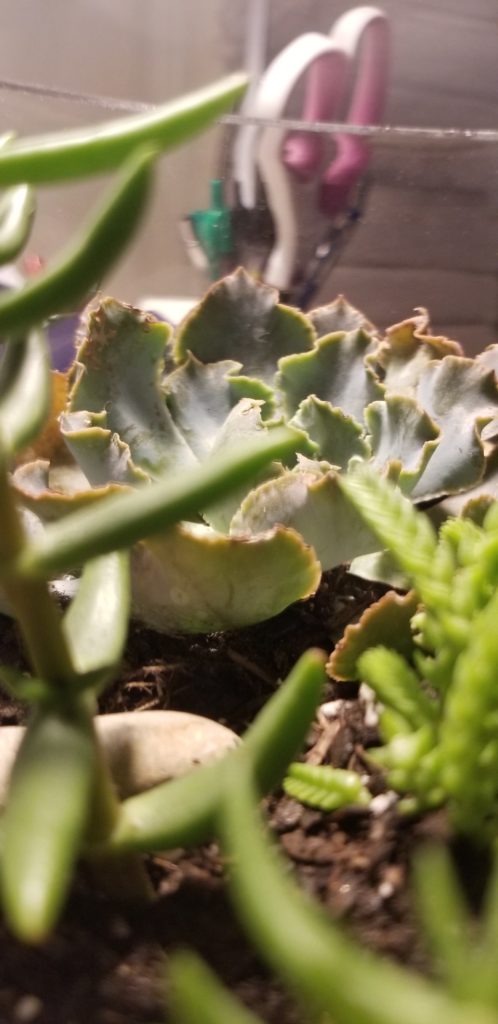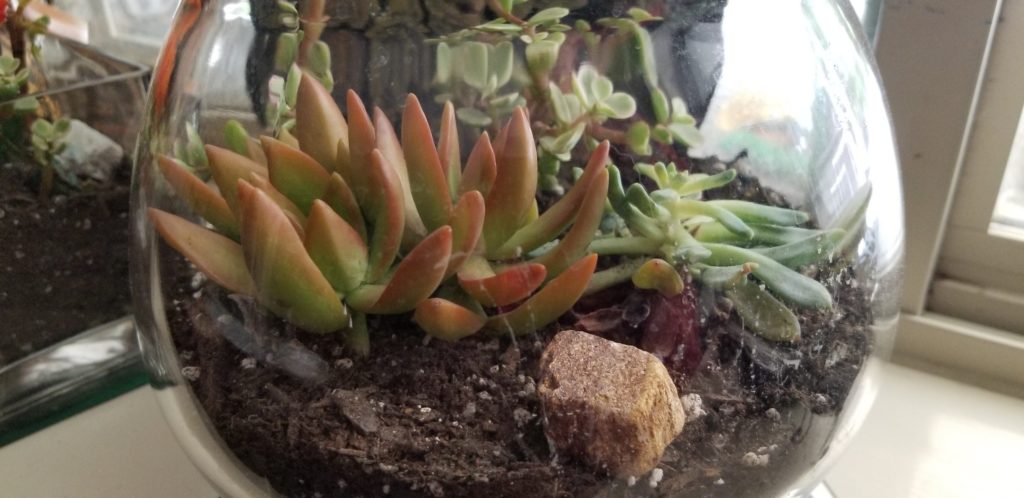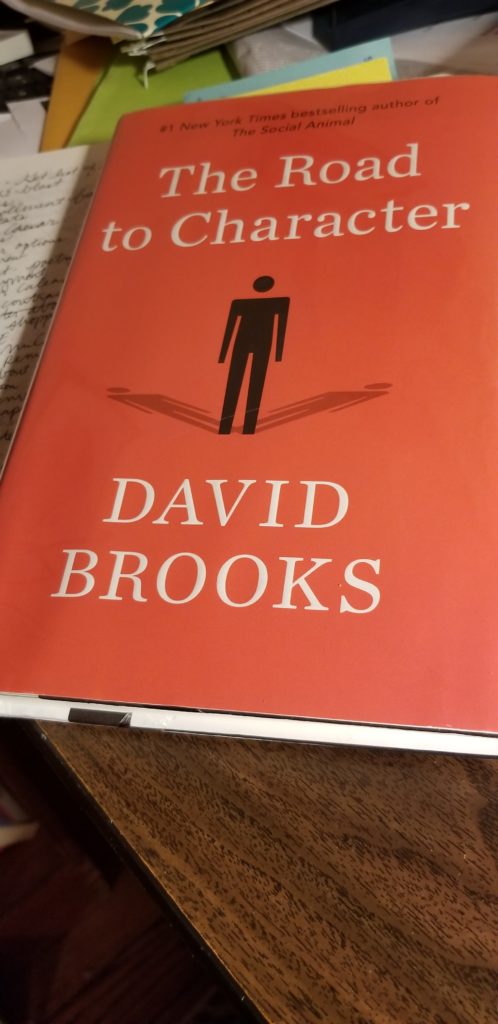I am a creature of enthusiasms. My latest, as you may already know from my deep and vital Instagram ministry, is the art of the Terrarium.
Do we need to know how it started? Do we need to revisit the sordid window ledge infested with piles of paper in Sterilite containers, some dating from 18 months ago and consisting of extra copies of worksheets from a classroom I no longer inhabit? We do not. We need only understand that the window deserved better. We all deserved better. And thus, the terrarium phase (Not a phase! A lifestyle! A signal of change!) has begun.

Oh, the initial stage of terrarium cultivation really is delightful. Not only are there manifold little friends to be planted, but perhaps you’ll have trouble understanding heights and capacities, and you’ll have to return to the thrift store for more glass vessels and to the garden store for more potting soil. There’s the Reddit channel for #terrariumgoals, there’s the newly-discovered Selective Focus mode on the phone camera, there’s the special potting mix for succulents and cacti – a distinction I definitely understand now, okay?
I mean, applaud my cultivation:

Fasten your seat belts for this drive down Simile Boulevard, folks, because I am about to share with you something revolutionary:
Caring for a plant is like caring for one’s soul, in that:
- You can’t just ignore it except when you feel like checking on it
- You have a duty to do the same sometimes-dull things every single day, pretty much, if you want the thing to thrive
- You are not guaranteed that your efforts will be instantly rewarded with abundant flourishing
- Repeatedly doing the same sometimes-dull things does indeed result in transformation – BUT THAT DOES NOT MEAN YOU QUIT DOING THE THINGS. KEEP GOING.
Here is a rabbit’s foot fern.

It appears to be bracing itself for its inevitable demise at my hands by draping itself over this Aristotle book for the time being. The fern has been around long enough to know that I am not going to remember to go buy a new pot for it, or to fill in the void in the big glass jar from whence it came after I took a whiff of the terrarium-in-progress and realized something was off. Despite its moderately charming tendency to send out soft little root-stems that resemble tarantula legs more than rabbit’s feet, it will probably get tossed into the yard unceremoniously in a few days when I remember it is still blocking my philosophical development.

Maybe I’m just mad at this fern because, when I peered down into the glass jar to determine the cause of the Bad Situation, it offered up to me one of my gray hairs it had been saving for just such an occasion.
Memento mori…
Amy Welborn has been exploring various aspects of online evangelization (and, more generally, contemporary models of faith-sharing in light of what our culture values). It is unnecessary to clarify that “she says all of this much more insightfully than I do,” and not just because I appear to be discoursing on plant hospices and not getting to the point. One of the questions she poses seems exactly correct:
Or could it be that this enormously popular equating of Christian flourishing with achievement and success reflects the present moment, as the enormously popular Norman Vincent Peale reflected his? That it reflects
- A privileged, prosperous culture. Far from survival mode, characterized by mobility and personal choice.
- A culture that values and privileges outward appearance: fitness and physical attractiveness
- A culture that emphasizes personal achievement as a measure of personal worth – whether that achievement be reaching your fitness goals, attaining a certain educational and professional goal – just setting those goals high and reaching for them!
- And one more time: a privileged, prosperous culture in which choice is prioritized because you can choose.
I am trying to stop chasing epiphanies. I realize that this is, in itself, an epiphany. See also:
Really, a lot of my epiphanies have been kind of dumb, or – AND THIS IS THE WORST – epiphanies I had six months prior, then forgot, then re-realized “all of a sudden.”
This seems at odds with the primary mode of much of online evangelization and in-person ministry, namely: “I finally realized that ______________ and thus my life was totally turned around.” Spiritual growth as a series of steps up, each one marked by the revelation that powered you through to a higher plane of understanding. (This is a prevailing narrative in self-help outside of the spiritual life, of course.)
Thus, the paradigm: we share our faith by showing the transformation and the joy that came from the epiphany and/or the emotional experience. The most important thing we can do is display our joy, and this joy will itself be powerful enough to invite inquiry from those who want what we have. The more we share, the more invitations we are extending.
Something I keep coming back to is that some struggles are more shareable than others, especially in a public forum. Those that are beyond our own ability to control, perhaps. Well, you can’t be blamed for feeling down when ____________ happened out of the blue. Those that primarily involve only oneself instead of a complicated network of people who might have different perspectives on the situation. Those that can be alleviated with the right combination of resources and a little bit of time, or that can be overcome with a bit more focus and personal responsibility.
And the struggles that are shared online or via personal testimonies in ministry are often accompanied by solutions manuals: I followed these steps, found the answer, and perhaps you could follow the same procedure to arrive at your own solution. I love solutions manuals, and I love following at least 61% of the steps of a process, so I eagerly consume this content and, when feasible, invest in the accompanying tools.
But Satan is the father of lies, and here are some variations on the lies that spring to mind in response to the problem/ephiphany/joy-strategy model of ministry:
- I can’t work out the solution for this struggle, even though this person whose life seems mostly like my own was able to overcome a similar problem. This must mean there is something wrong with me — unlike the evangelizers in my social media feeds (or the teachers, or the ministers). If we’re talking about this within a Christian context, the assumption might be I am insufficiently holy, unlike the person on whom I am trying to model myself.
- Conversely: None of these churchy people would have any clue how to deal with suffering like what I am experiencing, because it is too difficult/ugly/shocking. The Christian message is not for the sort of person that I am (particularly if I am in dire straits due to my own behavior and not some external cause).
- Therefore, the churchy people must either live in some better version of reality, or
- The churchy people must be faking it out of fear, condescension, or a desire for attention.
I am not sure how one gets around these challenges, especially when our interactions are limited based on the time we have, the privacy we need to preserve, and the extent to which we can pursue engagement with those to whom we are speaking.
And so my initial suspicion is that we should expect very little from the online world in terms of evangelizing, because there is only so much that one can do without being willing/able to carry out the true duties of a friend. By “duties of a friend,” I mean mutual self-disclosure and mutual assistance, in the expectation that doing so will lead to greater understanding and greater virtue. Online and in most memoir/testimonial writing, we end up with curated narratives. But it would be irresponsible in most cases for our narrators to put alllllllll the details out there for anyone to pick through, searching for affirmation or for a few minutes of envy. (I leave aside the truly unsavory possibilities of online interactions, creep-wise.)
I will either follow up on this more in a later post, or (as is more likely) neglect this blog like a dying fern for about three weeks and return to it when it can no longer be resurrected.






